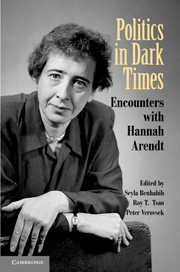Book contents
- Frontmatter
- Contents
- Notes on Contributors
- Introduction
- Part I Freedom, Equality, and Responsibility
- Part II Sovereignty, the Nation-State, and the Rule of Law
- Part III Politics in Dark Times
- Part IV Judging Evil
- 13 Are Arendt's Reflections on Evil Still Relevant?
- 14 Banality Reconsidered
- 15 The Elusiveness of Arendtian Judgment
- 16 Existential Values in Arendt's Treatment of Evil and Morality
- Index
15 - The Elusiveness of Arendtian Judgment
Published online by Cambridge University Press: 05 June 2012
- Frontmatter
- Contents
- Notes on Contributors
- Introduction
- Part I Freedom, Equality, and Responsibility
- Part II Sovereignty, the Nation-State, and the Rule of Law
- Part III Politics in Dark Times
- Part IV Judging Evil
- 13 Are Arendt's Reflections on Evil Still Relevant?
- 14 Banality Reconsidered
- 15 The Elusiveness of Arendtian Judgment
- 16 Existential Values in Arendt's Treatment of Evil and Morality
- Index
Summary
Truly political activities…cannot be performed at all without the presence of others, without the public, without a space constituted by the many.
Hannah Arendt, “The Crisis in Culture”…as a spectator you may understand the “truth” of what the spectacle is about; but the price you have to pay is withdrawal from participating in it.
Hannah Arendt, The Life of the Mind…exclusion from politics should not be derogatory…self-exclusion, far from being arbitrary discrimination, would in fact give substance and reality to one of the most important negative liberties we have enjoyed since the end of the ancient world, namely freedom from politics, which was unknown to Rome or Athens and which is politically perhaps the most relevant part of our Christian heritage.
Hannah Arendt, On RevolutionOne of the freedoms that representative democracy protects is the freedom not to participate actively in politics, the freedom to stand on the sidelines and watch. In modern liberal democracies, most citizens take advantage of this freedom most of the time. Not participating seems to be the most common activity of democratic citizenship today. Among political scientists and political theorists, the overwhelming tendency is to lament this state of affairs and to long for a more participatory politics. This chapter emerges from a different perspective on how best to defend democratic politics. I am interested in understanding and defending a kind of citizenship that is closer to what most citizens do in modern liberal democracies. To be clear, this is not a defense of passivity. Passivity is not the only kind of nonparticipation that we find in our politics, and it is clearly not the best kind. But many citizens who do not participate are also not entirely passive. Instead, they watch politics and they judge what is going on. A certain type of watching and judging is, it seems to me, a defensible way of being a democratic citizen. Of course, there are also unattractive versions of this activity – the combination of watching and judging that I want to explore must be distinguished from close cousins, such as judging without watching (prejudice) and watching without judging (being entertained). To make such distinctions adequately, we first have to establish the potential dignity of the citizen understood as a judging spectator, and to do that we have to explain precisely what the faculty of judgment is.
The suggestion of this chapter is that Hannah Arendt's reflections on judgment can fruitfully be read as part of such a defense of the citizen as spectator-judge. This might be a surprising thesis about Arendt. She is best known as a theorist of action, not spectatorship, and her conception of politics in the strong sense of the word was one that seemed to give priority to those citizens who joined the controversy and debate of political life and disclosed themselves to others by taking action in the public arena. The American revolutionaries whom she admired in On Revolution were those who created a realm of politics through action. And her influence among political theorists is most obvious among those who defend a participatory conception of politics in which active contestation is central. So I must admit from the beginning that my effort to enlist Arendt in the defense of any kind of non-action pulls against a major strain of her thought, and against the most important legacy that her thought seems to have left behind.
- Type
- Chapter
- Information
- Politics in Dark TimesEncounters with Hannah Arendt, pp. 316 - 341Publisher: Cambridge University PressPrint publication year: 2010
- 4
- Cited by



